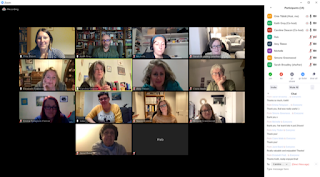EVENTS Workshop with Keith Gray
What have the TV series Game of Thrones and dominoes got to do with writing for reluctant readers? Keith Gray took his recent SCBWI Scotland workshop Writing for Reluctant Readers in some unexpected directions. Claire Watts reports.
This was the first event organised by new Network Organisers Onie Tibbitt and Caroline Deacon – and even though I’d never particularly thought about writing for reluctant readers I’m always open to looking at new avenues for my writing. Keith was brilliant – it’s all too easy to fall in to pleasing oneself as a writer or focus on producing what publishers or agents want, but Keith’s workshop brought me back to the primary focus: what does a child want to read?
Why are some readers reluctant?
Keith was a reluctant reader as a child. Books were for school and there were more interesting things to do outside school. He outlined four reasons many young people turn away from reading, reasons which often overlap. 1. Dyslexia, autism, other conditions which make the act of reading more difficult. 2. Lack of relatability within available reading matter. 3. Lack of awareness of what reading matter is available. 4. ‘Better’ (or easier) stuff they’d rather be doing. Boys are three times more likely to be reluctant readers, though a lot of boys who appear reluctant are actually reading nonfiction.
What to write
- Don’t try to compete with movies, games, Tiktok. There are some things a book just can’t do. Books are good at digging into experiences and heightening emotion and empathy with rich storytelling.
- Don’t be preachy about morals or taste. Offer young people questions and let them work out their own answers. Or, as Keith put it, “Throw the grenade into the room and let them deal with it.”!
- Don’t try to be cool or up to date. Your book will be out of date in no time and young readers will not be impressed.
- Generally stick to reality-based fiction which readers will relate too. Genre fiction such as fantasy takes a lot of world-building which will slow the story down.
- Stick to linear storytelling, avoiding flashbacks as much as possible, especially in the opening chapter.
- Use a single point of view, either first person or close third person.
- Think of the plot like a row of dominoes (I told you there’d be dominoes). After you tip the first one, it’s inevitable that the next and the next will fall all down the line. Inevitable non-stop forward momentum in your plot will keep reluctant readers hooked.
- Exposition will make your reader put the book down. Take a Game of Thrones approach. They invented ‘sexposition’ – every time some complex nitty gritty needed to be explained to the viewer it was done while characters were having sex. The visuals kept the viewer interested while the information was given. So if you need to explain something in your book, have your characters engaged in something exciting that’ll keep the reader engaged.
- Dialogue needs to be relatable while not trying to imitate the way teens speak in the moment (because that’ll have changed by next week let alone by the time the book is published). Keep your language consistent within the world of the book. Strong language is useful because young people use it a lot and it doesn’t age as much as other slang. Publishers have different opinions about bad language so there may be some discussion about this along the path to publication.
- Write an amazing ending. This is what your reader will take away from your book. If the ending is amazing you’re setting your reader on a course to pick up another book. You’re making them into a reader.
After our heads were buzzing with all this information, Keith gave us two writing exercises to do which in the moment I found very difficult but which the next day had me racing back to my current work-in-progress to find out how I was dealing with sowing information in as my story progressed.
Great start to your new role Caroline and Onie – I look forward to whatever you have in store for SCBWI Scotland!
*
Claire Watts is a writer and editor of fiction and nonfiction for children. Website: https://www.clairejwatts.com Twitter & Instagram: @evangelinecluck*
Gulfem Wormald is the Editor of Words & Pictures. Contact: editor@britishscbwi.org Twitter: @GulfemWormald










No comments:
We love comments and really appreciate the time it takes to leave one.
Interesting and pithy reactions to a post are brilliant but we also LOVE it when people just say they've read and enjoyed.
We've made it easy to comment by losing the 'are you human?' test, which means we get a lot of spam. Fortunately, Blogger recognises these, so most, if not all, anonymous comments are deleted without reading.